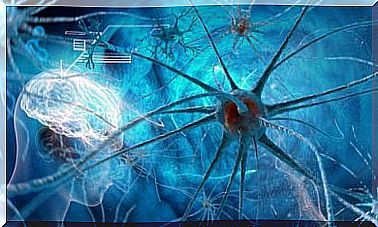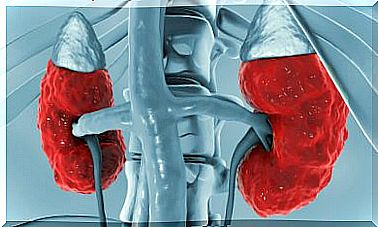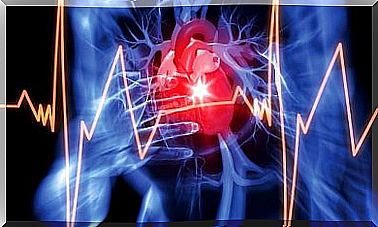What Is Hydrocortisone?
Hydrocortisone is the name for the drug that contains the hormone cortisol. This drug can be found on the market under the name of hydrocortisone or under different brand names.
It is available for different routes of administration, as needed. There are preparations for oral administration, injection for intravenous application and ointment for the topical route.
It is indicated for the treatment of different diseases, such as adrenocortical insufficiency, adrenogenital syndrome, hypercalcemia, thyroid inflammation, rheumatoid arthritis, asthma and COPD. However, we will see it later in more detail.
Hydrocortisone was discovered as early as 1955 and is included in a list created by the WHO (World Health Organization), which indicates the drugs that a health system must have at its disposal.
Main indications of hydrocortisone

Hydrocortisone is classified as a corticosteroid drug, so it can be used in many situations. In the first place, hydrocortisone alleviates inflammatory processes, which is why it is administered as an anti-inflammatory drug when necessary.
It also has immunosuppressive effects. Due to this, it can be used in autoimmune diseases such as rheumatoid arthritis (to which is added its anti-inflammatory effect). In turn, it is administered in patients with asthma or other lung conditions.
Hydrocortisone may be indicated to treat or prevent allergic reactions and for the treatment of different cancers such as leukemia, lymphoma, or multiple myeloma.
On the other hand, it is used as a steroid replacement therapy in conditions that present with an insufficiency of the adrenal gland, as shown by the results of the studies. This type of disease develops with a decrease in the necessary production of steroids.
Other indications for hydrocortisone are:
- Stimulate the appetite in cancer patients with serious problems of this type.
- The ointment is used to treat allergic skin reactions, as well as to relieve symptoms of itching, redness, and inflammation.
- Prevention and treatment of nausea and vomiting associated with some anticancer therapy, such as chemotherapy.
Mechanism of action: how does hydrocortisone have an effect on the body?
The effects triggered by hydrocortisone, as well as that of all endogenous corticosteroids secreted by the adrenal cortex, are due to the enzymatic modifications they produce, not due to a specific action of the hormone.
Hydrocortisone has mineralocorticoid and glucocorticoid effects. The former alter the balance of fluids and electrolytes, which facilitates the reabsorption of sodium and hydrogen, as well as the excretion of potassium. Consequently, it is effective in edema and hypertension.
Regarding the glucocorticoid effects, they are involved in other metabolic pathways such as:
- Gluconeogenesis.
- Fat redistribution.
- Protein metabolism.
- Calcium balance.
On the other hand, hydrocortisone also has anti-inflammatory effects, which are due to its ability to inhibit phospholipase A2, which is a molecule that belongs to the lipocortin family.
These substances modulate the synthesis of inflammatory mediators. Therefore, being inhibited, these molecules cannot be synthesized and the inflammatory condition is improved.
Finally, it should be mentioned that it also inhibits the release of adrenocorticotropic hormone from the pituitary gland. This effect must be taken into account, since if administered in high doses and over a long period of time, the adrenal cortex can atrophy.
Adverse reactions of hydrocortisone

Hydrocortisone, like all drugs on the market, is not without triggering a number of side effects. Adverse reactions are defined as all those expected events that occur undesirably and unintentionally with the treatment of a drug.
It is important to keep in mind that not all people suffer from these reactions or do not manifest them in the same way. The effects vary from patient to patient. In addition, they are usually reversible and tend to disappear on their own over time. As for the most common, that is, those with a prevalence greater than 30% are:
- Increased appetite
- Sickness.
- Stomach ache.
- Insomnia.
- Fluid retention.
Conclution
Hydrocortisone is the name for cortisol when given as a medicine. It is used to treat many pathologies. In addition, you should always follow the doctor’s recommendations, since misuse of it can trigger unwanted health reactions.









